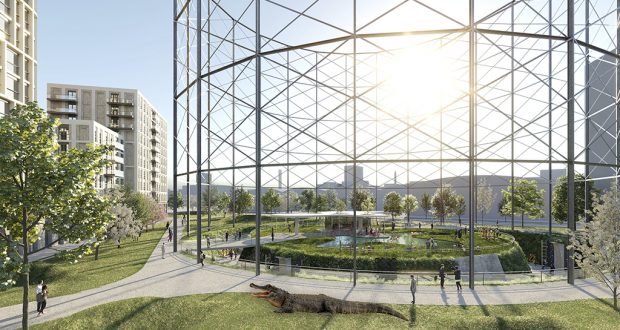
London developer plots alligator park at new housing site
- Category: Commercial
- Date: 17-01-2020
An alligator park and farm could take centre stage in a £230m regeneration project in South London if planners snap up a proposal.
Developer Avanton has announced it wants to turn the Grade-II listed Gasholders site in Old Kent Road into a tourist attraction, educational centre and “unique ecological habitat” for the predatory reptiles.
The former gasworks is to become a £230m mixed-use regeneration project featuring hundreds of new homes, open space as well as more than 50,000 sq ft of light industrial commercial use.
In a statement, it said it could put special shielded glass on part of the 50 metre-high gasholder frame, to create a conservatory and pavilion for the alligators. It added: “Sliding glass panels in the conservatory [would] enable the temperature of the alligator park to be raised or lowered to keep the housed reptiles at optimum temperature for their health and wellbeing.”
A CGI released alongside the plan shows an alligator roaming the site outside of the gasholder frame.
The developer said it would not proceed without further consultation with animal experts. It said it has alternative options for the frame, including turning it into an “art-like feature”.
Avanton director Marc Pennick said: "We want to turn the gasholder into something really special for London." He added that an the concept came to the developer following "an approach from an out-of-town specialist looking for a location for an alligator park in the capital".
Historic England has listed the Gasholder frame, meaning it would face extra scrutiny alongside that which would come from Southwark Council. Built in 1881, the structure is listed on the basis that it was a feat of civil engineering when it went up. It was the first such frame built as a cylindrical lattice shell, an approach later widely adopted, and which meant it was built up tier-by-tier as it required a complete circle for its structural integrity.
Environmental expert Dr Duncan Westbury, a principal lecturer at the University of Worcester, didn’t rule out the possibility of some ecological benefit brought about by having alligators living in an urban environment but said this would only happen if the water pools they use were open to the elements. He told Construction News that such pools would provide drinking water for numerous bird species, and in turn the alligators could help reduce numbers of feral pigeons, which is an issue in many areas. He said that if the structure was fully enclosed it would be unlikely to have any ecological benefit.
He also asked: “In conservation terms what is the rationale behind this scheme? Would this be part of a breeding programme for the benefit of the species, or solely for public enjoyment?”
There is currently one crocodile-only zoo in the UK, which opened in 2011 in Oxfordshire. It features a series of enclosures and runs a conservation and breeding programme.
Avanton is also the developer for a nearby £520m tower, which is part of a scheme called Ruby Triangle.
